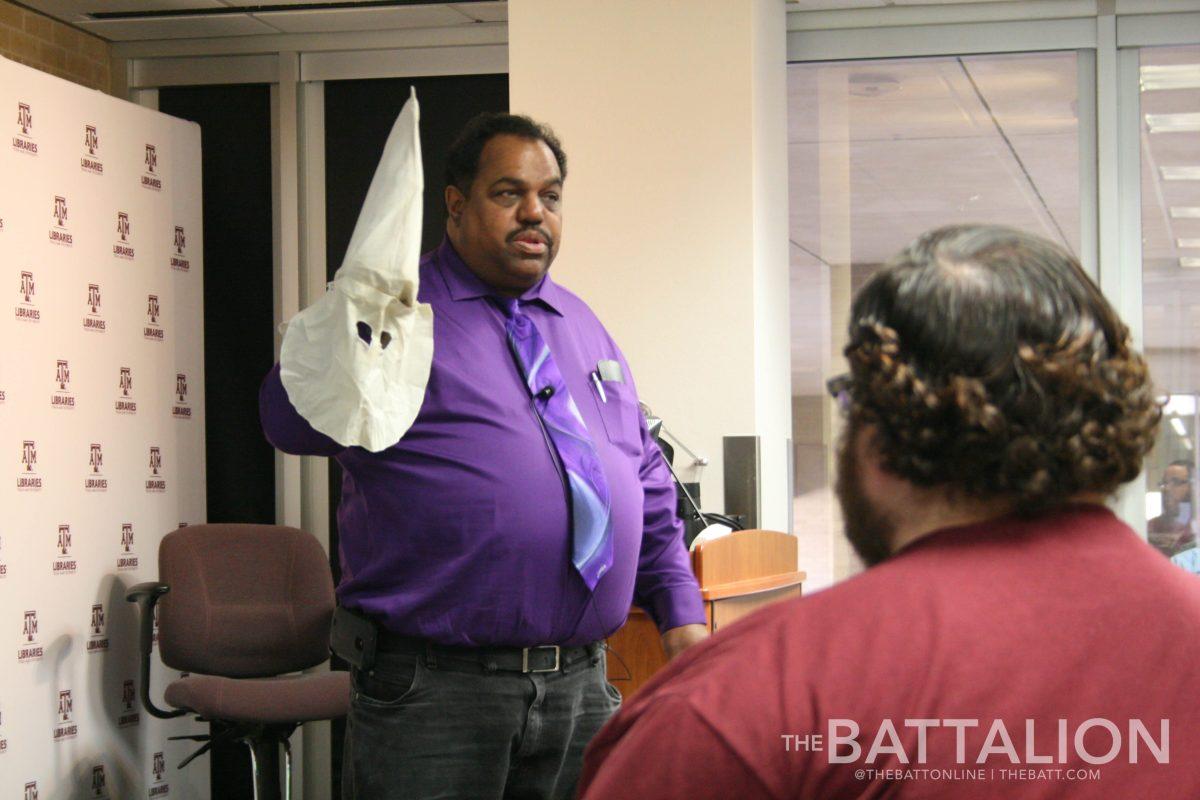When musician and activist Deryl Davis was 10 years old, he began to wonder how people who did not know him could hate him because of his skin color.
While growing up, Davis frequently encountered people who treated him differently, including Matt Koehl, longtime leader of the American Nazi Party, who told him he would be “shipped back to Africa.” As an adult, Davis decided to start conversations with his opposition, which has resulted in many members of the Ku Klux Klan (KKK) withdrawing their association with the organization. The University Libraries Diversity Advancement Committee hosted Davis on Tuesday, where he spoke about his experience communicating with those who harbor prejudice against him.
Davis said he was first exposed to racist treatment at the age of 10, when he marched in a parade with the Cub Scouts in Belmont, Massachusetts.
“I was the only black scout participant in this march,” Davis said. “The streets were blocked off and the sidewalks were lined with nothing but white people, waving at us, cheering us, waving flags. My den mother let me carry the American flag, and as I’m marching with my fellow scouts down the parade route, all of a sudden I was getting hit with bottles, soda pop cans, rocks and debris from the street by a small group of white spectators on the sidewalk. My first thought was, ‘Oh, those people over there don’t like the Scouts.’ That’s how naive I was.”
Davis said when he told his parents about the incident, they sat him down and explained racism. Davis said he had never heard the word, and he thought his parents must have been lying to him.
“My 10-year-old head could not get around the idea that someone who had never laid eyes on me, never spoken to me, who knew absolutely nothing about me, would want to inflict pain upon me for no other reason than the color of my skin,” Davis said. “It made no sense to me.”
Davis recalled a day from his sophomore year of high school, when American Nazi Party leaders Koehl and Martin Kerr visited his class. The two told Davis and another black student they would willingly go “back to Africa” or be killed. As an adult, Davis had the opportunity to talk with Koehl and realized he could learn about racism through these conversations.
“There was the answer to my question that I had been looking for since age 10,” Davis said. “How can you hate me when you don’t even know me? Who better to ask than someone who had joined an organization whose whole history has been a premise of hating people who do not look like them, and who do not believe what they believe?”
Davis began a mission to talk to opposition throughout the country, and eventually formed a relationship with then KKK Grand Dragon Roger Kelly. Over the years, the two met and discussed race relations, the Klan and other controversial issues. Davis said this method is an important way to learn about opposing ideals.
“If you have an adversary, someone with an opposing point of view … give your adversary a platform,” Davis said. “Allow them to express their views, regardless of how extreme they may be. Listen to them. If you agree with them, fine, no problem. If you don’t agree with them, that’s fine too, still no problem. But you challenge them. You challenge them, not violently or rudely. You challenge them intelligently.”
After 20 years in the KKK, Kelly left the group, which Davis said was due in part to the intellectual challenges he had presented. John Bondurant, clinical assistant professor at Cushing Library and host of the event, said Davis’ focus on education aligned with the mission of the university and its libraries.
“He started learning about these organizations and in learning about [them], he realized they are based on ideas that are just not true and learned how to counter them,” Bondurant said. “It lets them see that he’s not someone who is a threat … it all starts with educating yourself and learning about others, and learning about a person.”
Jonathan Dietzel, marketing graduate student, said the event inspired him to have important discussions with people unlike himself.
“It’s just so incredibly simple, the ways in which we can become more like human beings and less divided by race and other things like sexual orientation and all these little things that put us in community,” Dietzel said. “Community is important, but I feel that we should be in community with everyone as human beings.”
Conversations with the opposition
April 10, 2018
Photo by Photo by Taylor Fennell
Deryl Davis spoke about his conversations on the topic of racism with members of the KKK and American Nazi Party.
0
Donate to The Battalion
Your donation will support the student journalists of Texas A&M University - College Station. Your contribution will allow us to purchase equipment and cover our annual website hosting costs.
More to Discover









